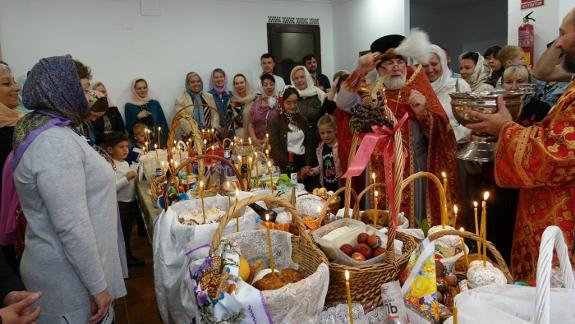

Secciones
Servicios
Destacamos

ALEKK M. SAANDERS
Friday, 30 April 2021, 18:21
Father Dimitry Osipenko has been serving at the Russian Orthodox Church on the Costa del Sol since 2009. The congregation is currently based in the Ascension church in San Pedro Alcántara, where Dimitry is preparing to celebrate Orthodox Easter, or Paskha, this weekend.
The Marbella priest told SUR in English that the presence of the Russian Orthodox Church in Spain dates back to 1761, when in Madrid, under the Russian envoy to Spain, Peter Repnin, the first church was established in the name of St Mary Magdalene. So-called 'house church' was attached to the embassy, hence moved several times with it.
In 1882, the church was abolished due to a reduction in government spending. In December 2011, the foundation stone of the Russian Orthodox Church was consecrated in Madrid. Additionally, over recent years, Russian Orthodox churches have also been constructed in Barcelona, in Altea (Valencia), and in Adeje (Canary Islands).
The church in Marbella is now preparing to move to new premises in Estepona. In 2017, it was announced that the new building would be the biggest Russian Orthodox church in Spain, and the first in Andalucía. The project includes the church and a social-cultural centre spread over nearly 6,000 square metres of land in Arroyo Las Cañas, on the way up to the Selwo park.
The Spanish architects planned this to be an iconic building, with a separate bell tower, constructed with Mediterranean materials.
Father Dimitry said that the church in Estepona is really unique and different from other Russian Orthodox churches in the country. It is almost finished but construction has stopped due to the pandemic because it's difficult to invite specialists from abroad for interior painting and decorating. The planned inauguration in 2021 will be postponed but the next Easter celebrations could be held in the new church.
Easter
In the meantime, Father Dimitry will hold Paskha, the main holiday of the Russian Orthodox Church, this weekend in the church in San Pedro.
Orthodox Easter is usually celebrated later than Catholic Easter, because the church follows the old Julian calendar, unlike the Roman Catholic and Protestant churches, which have been using the Gregorian calendar since the 16th century. Besides Russia and Ukraine, Bulgaria, Cyprus, Greece, Lebanon, Republic of Macedonia and Romania are among countries that officially celebrate Orthodox Easter.
Easter is preceded by 40 days of Great Lent. Those who observe it are not supposed to eat meat and, on some days, even vegetable oils. On the last Friday before Easter, no food or drink should be consumed until the evening. Instead of chocolate eggs, hen's eggs are dyed red using onion skins, while spinach and beetroot make them green and purple, respectively.
Traditionally on the evening of the Orthodox Easter Saturday, people go to church with traditional food - a special kind of yeast bread, and a pyramid-shaped cake made of cottage cheese and raisins. The foods are blessed during the church service.
Father Dimitry said, however, that this year the service will have to be different due to the pandemic.
Events usually start around 11pm and before midnight the church lights are extinguished. After midnight, the church is illuminated with candlelight and the congregation forms a procession around the church.
The priest said: "This time this part of the celebration will not take place but we invite people for customary services in the morning and evening. The Sunday Easter service starts at 8.30am on 2 May."
Father Dimitry added that anyone who has questions about Orthodoxy and its peculiarities, is welcome to visit the church in Marbella and its website (www.rpc-marbella.es).
Western Europe
The Russian Orthodox Church in Western Europe was founded exactly one hundred years ago this month. After the onset of the Bolshevik Revolution in 1917, the Church opposed the Soviet government that had banned the religion and was destroying temples around the country. On 8 April 1921, Patriarch Tikhon of Moscow and Metropolitan Benjamin of Petersburg issued a decree creating the Provisional Administration of Russian Parishes in Western Europe, centred in Paris.
In December 2018, the Holy Synod decided to dissolve the Archdiocese of Russian Orthodox churches in Western Europe, leading to the creation of the Diocese of Madrid and Lisbon. Nestor Sirotenko is Archbishop of the diocese. At the time of segregation, there were 11 parishes of the Russian Orthodox Church and communities in Portugal and 25 parishes with 17 priests in Spain.
Noticia Patrocinada
Publicidad
Encarni Hinojosa | Málaga
Cristina Cándido y Álex Sánchez
Rocío Mendoza | Madrid y Lidia Carvajal
Esta funcionalidad es exclusiva para registrados.
Reporta un error en esta noticia

Debido a un error no hemos podido dar de alta tu suscripción.
Por favor, ponte en contacto con Atención al Cliente.

¡Bienvenido a SURINENGLISH!

Tu suscripción con Google se ha realizado correctamente, pero ya tenías otra suscripción activa en SURINENGLISH.
Déjanos tus datos y nos pondremos en contacto contigo para analizar tu caso

¡Tu suscripción con Google se ha realizado correctamente!
La compra se ha asociado al siguiente email
Comentar es una ventaja exclusiva para registrados
¿Ya eres registrado?
Inicia sesiónNecesitas ser suscriptor para poder votar.